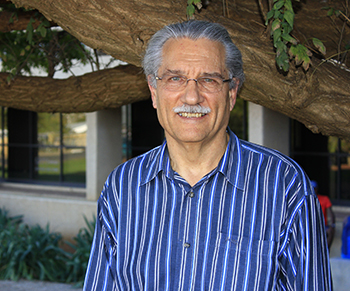Latest News Archive
Please select Category, Year, and then Month to display items
13 January 2020
|
Story Eugene Seegers
|
Photo Anja Aucamp
 Spearheading the digital expansion of the conversational Sesotho course is IDEAS Lab Director, Johann Möller (middle). With him are from the left: Prof Pule Phindane, CUT; Dr Brenton Fredericks, CUT; Bahedile Letlala, UFS Department of African Languages; and Dr Elias Malete, UFS Department of African Languages.
Spearheading the digital expansion of the conversational Sesotho course is IDEAS Lab Director, Johann Möller (middle). With him are from the left: Prof Pule Phindane, CUT; Dr Brenton Fredericks, CUT; Bahedile Letlala, UFS Department of African Languages; and Dr Elias Malete, UFS Department of African Languages.
For many years now, the UFS has been offering a one-year course in conversational Sesotho for staff members; this can then be followed up with the one-year course in advanced conversational Sesotho. The conversational Sesotho for students in the Faculty of Education was introduced in 2018 at the UFS.
The Central University of Technology (CUT) needed a conversational course for its first-year students and approached the Department of African Languages for the development of such a course. Living as we do in a multilingual country; this additional language skill opens doors and often hearts as well.
Using instructional design principles
However, the need was identified by both CUT and UFS to present this crucial information in a way that would be more appealing to digital natives as well as to those less familiar with technology. The Department of African Languages on the UFS Bloemfontein Campus, together with relevant departments from the CUT, approached the IDEAS Lab located on the UFS South Campus, since they already have a reputation for being a specialist on broadcasting and repackaging curricular content for digital presentations. The IDEAS Lab provided technical advice and built the multimedia programme, which will help the user to hear and practice phrases in Sesotho, using instructional design principles. The course will be available to both staff and students belonging to the two universities.
Room for growth
Johann Möller, Director of the IDEAS Lab, says this pilot programme will give both institutions the opportunity to test the use of multimedia for language acquisition. He adds, “Language is extremely complex, and we would like to expand this learning aid in the future.” In fact, the original design has room for growth built into it.
To keep things simple for the user and the building team, it was decided to start out with only four potential everyday scenarios where a staff member would like to speak Sesotho: Firstly, how to greet other persons from different genders; secondly, potential scenarios one might encounter in the university environment itself; thirdly, how to deal with situations at a hospital; and finally, how to use one’s language skills at a filling station.
Pronunciation is key
Each scenario contains three to four conversations that the learner can revise, along with images and audio that illustrate the situation and assist with correct pronunciation. The system does not allow the user to progress unless they have listened to the pronunciations of the sample sentences or phrases.
Further reading material and vocabulary lists are also provided, with the result that people who are using the programme can learn at their own pace. The authoring software Articulate Storyline was used to build the individual scenarios and each conversation or lesson within it. The lessons are also not dependent on an internet connection; they can be downloaded onto a flash memory drive and used offline.
Former UFS Dean awarded SAAWK medal for contribution to Bible translation work
2016-05-09

Prof Hermie van Zyl
Photo: Eugene Seegers
|
Prof Hermie van Zyl, former Dean of the Faculty of Theology at the University of the Free State (UFS), was recently awarded the Ds Pieter van Drimmelen medal by the South African Academy of Science and Arts (SAAWK) for his contribution to Afrikaans Bible translation and other translation work.
Prof Van Zyl was part of the team that published the Interlinear translation of the Bible (New Testament) in Greek and Afrikaans. This translation takes the reader from the original text (Greek), to an almost verbatim version, to a rough translation, and, ultimately, to a more polished, finished translation in the target language of Afrikaans.
Other translations Prof Van Zyl has been involved in include the Afrikaans Bible for the Deaf (published in 2008), the direct translation of the Bible (of which the New Testament and the Psalms have already been published), the New Living Translation, the Parallel New Testament, and the Reference Bible. He is the first lecturer from the Faculty of Theology at the UFS to receive an award from the SAAWK.
“It is a wonderful privilege and an honour and really came out of nowhere,” said Prof Van Zyl. He added that he is grateful that, amongst all the wonderfully talented people at the UFS, he could make a modest contribution. He mentioned that the collegial conversations, seminars, and other discussions in the faculty over the years, were very stimulating. He singled out Prof Jan du Rand and Prof Francois Tolmie (another former Dean of the Faculty and long-time colleague in the department of New Testament Studies) as inspiration.
The official presentation of the medal will take place in the Atterbury Theatre in Pretoria on 29 June 2016.
Prof Van Zyl was employed in the Faculty of Theology at the UFS for 29 years until his retirement in 2013. He is currently a Research Fellow in the Department of New Testament, and still lectures on occasion.